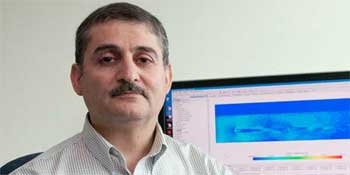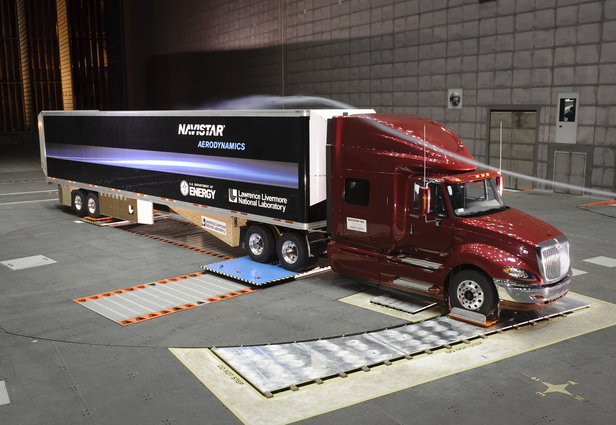Salari earns HPC Innovation Award
The International Data Corporation (IDC) announced the award Monday morning at the International Supercomputing Conference (ISC11) in Hamburg, Germany.
"This award recognizes the effort of the team that worked on this project, which was founded by LLNL's Rose McCallen in 1997," Salari said. In 2005, Salari took over leadership of the LLNL program. The project has applied advanced computing techniques to the reduction of aerodynamic drag in tractor trailers and has demonstrated that high performance computing can be applied to everyday problems with a big potential payoff.
Using a virtual testing approach, Salari, colleague Jason Ortega and collaborators were able to design easily attachable devices able to reduce a tractor trailer's aerodynamic drag, providing up to 17 percent fuel efficiency. This fuel economy potentially translates into 6.2 billion gallons of diesel fuel per year and a reduction of 63 million tons of carbon dioxide emissions. The projected cost savings per year, based on U.S. average diesel fuel cost of $3.91, is approximately $24.2 billion.
Virtual testing also accelerated the testing of drag reduction concepts and reduced the need for the costly prototypes otherwise needed to identify a successful aerodynamic design. The drag reduction concepts were evaluated in full-scale wind tunnel and track tests conducted in collaboration with Navistar and NASA Ames (wind tunnel).
A mechanical engineer by degree, Salari has worked at LLNL since 2001 applying his expertise in computer modeling and simulation, an outgrowth of his longstanding interest in fluid dynamics. Criteria for the IDC award include: showcasing success stories involving HPC in science and industry; helping other users understand the benefits of HPC; demonstrating the value of HPC to funding bodies; and garnering public awareness of and support for investment in HPC. In all, nine projects received awards this year.
Contact
Donald B Johnston[email protected]
925-423-4902
Related Links
Team design work drives greater fuel efficiencyKambiz Salari computes dynamics of his career,
Reducing Aerodynamic Drag
Reducing Aerodynamic Drag on Heavy Trucks
Tags
HPC, Simulation, and Data ScienceComputing
HPC Innovation Center
Featured Articles









